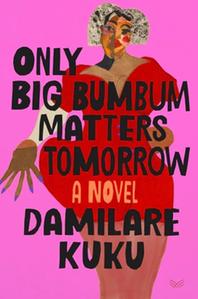
 Undoubtedly, 2024 is Damilare Kuku's year. Her debut collection, Nearly All the Men in Lagos Are Mad, proved she's a formidable storyteller. She further displays that prowess in her first novel, Only Big Bumbum Matters Tomorrow, a polyphonic masterpiece that opens with a 20-year-old woman's proclamation: "I plan to renovate my bumbum in Lagos, live there for some time, and hopefully meet the love of my life!" Her timing is awkward: the assembled family has just heard the reading of her beloved father's will. Shock aside, the one thing Témì can say is "Nigerian families can be an obstacle in a girl's journey to a figure eight."
Undoubtedly, 2024 is Damilare Kuku's year. Her debut collection, Nearly All the Men in Lagos Are Mad, proved she's a formidable storyteller. She further displays that prowess in her first novel, Only Big Bumbum Matters Tomorrow, a polyphonic masterpiece that opens with a 20-year-old woman's proclamation: "I plan to renovate my bumbum in Lagos, live there for some time, and hopefully meet the love of my life!" Her timing is awkward: the assembled family has just heard the reading of her beloved father's will. Shock aside, the one thing Témì can say is "Nigerian families can be an obstacle in a girl's journey to a figure eight."
For her entire young life, people have relentlessly judged Témì's body. The invasive barrage about her backside--"blackboard," "mopstick," "inverted"--has been never-ending from family, friends, even strangers on social media. She confesses to her father just before his death, "I just want to be seen... it seems like the world will only see me if I have a backside." The living aren't supportive: fatal reports abound and no one wants to bury another family member. But Témì's declaration exhumes all manner of buried secrets as to how self-mutilation seems to be a young woman's sole path to finding true love and therefore happiness. Despite their sizable bumbums, though, what was labeled "love" hasn't been kind to the women in Témì's life: her mother Hassana survived assault; her older sister Ládùn battled desertion then lies, both her paternal and maternal aunts endured abuse and abandonment. So-called true love (with others) even steals away her best friends. And yet Témì's insistence on surgery persists: "I am doing it for me."
Kuku's novel is not unlike her impressive collection--sharply insightful, bitingly funny, wondrously poignant--except her stories here are also intricately, exquisitely interconnected. Her pointed shifts in pronouns between chapters are small-but-mighty literary enhancements: Hassana, Ládùn, and the aunts are all granted first-person narrative control when revealing themselves; third-person is reserved for outsiders--the lawyer, doctor, prophet. Témì's chapters are notably presented in the second person "you," as if an empathic caution to "the young people of today whose Tomorrow... is filled with too many expectations: for young women to be perfect, sexy," Kuku writes in her author's note. "When did perfection become the goal?" Kuku nevertheless also recognizes "the girls who went under the knife for themselves, you are bad bitches." Témì becomes that everywoman searching for acceptance and affirmation--by any means necessary. --Terry Hong
Shelf Talker: A young Nigerian woman is determined that surgical backside enhancement is the only path to finding true love and happiness in Damilare Kuku's wise, funny, irresistible debut novel.

